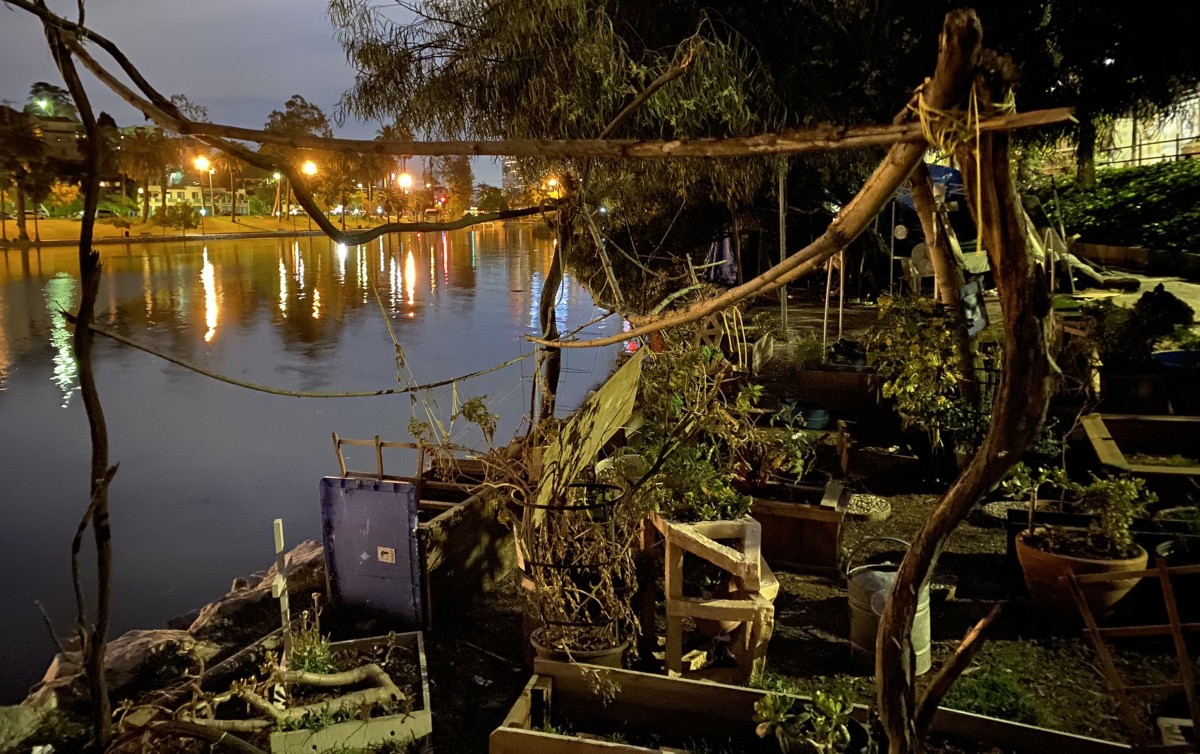A report from the ground in Los Angeles following the first attempted police raid of the Echo Park encampment on March 24th.
At 7am on March 24, upwards of 200 people held a demo at Echo Park Lake in Los Angeles. The gathering was called for a few days prior, in defense of an unhoused camp at the park. Over the course of the pandemic, the camp swelled to around 300 tents. Alongside the tents, unhoused residents and others in solidarity built collective infrastructure which maintained the camp and provided for a degree of autonomy from the city’s notoriously unfit social services. A community garden, running water, showers and trash removal formed a web of refuge within a broader state-enforced condition of duress. Although the cops didn’t sweep the camp on the morning of the 24th, later in the day rumors of a nighttime raid began to circulate. Photos posted to Twitter showed an LAPD staging ground where huge masses of cop cars and arrest buses had set up just a couple miles from the park. A second demo was called to begin at 7pm.
Before most people could even show up to the park, police in riot gear had formed lines blocking off all but one entrance to the area surrounding Echo Park Lake. Many turned away, unable to find a way into the park, or gathered in small groups at the closed off entrances. Hundreds of others circumnavigated the police lines and formed a crowd on Glendale Boulevard, confronting the cops despite their heavy handed attempts to enforce the sweep and tactical advantages. The crowd utilized fireworks, shields and flashlights. Some small crews came prepared with goggles and other protective gear. At certain points, the relatively small but determined crowd was able to push lines of police SUVs into retreat.
The night of March 24th saw some of Los Angeles’s most motivated clashes since last summer’s George Floyd Rebellion. As a result, the sweep was called off for the night.
The night of March 24th saw some of Los Angeles’s most motivated clashes since last summer’s George Floyd Rebellion. As a result, the sweep was called off for the night, but city workers constructed a fence surrounding the park to prevent residents from coming and going. This enclosure reminds us that the city’s motivation for the sweep is both a continuation of the ongoing criminalization of houselessness, and the prerequisite for a 500-thousand-dollar “renovation” of the park itself.
While defense of the houseless camp is certainly motivation enough for action on the part of Angelenos, it is not the only motivation for the city’s siege on Echo Park Lake. The park is frequented by punks, Latinx cyclist crews, queers, rave kids, un-permitted street vendors, and various rowdy groups of friends. The air at the lake on any given weekend is filled with overlapping soundtracks: cumbia, trap, hardcore, techno and reggaeton taking up space in the sonic landscape. During the summer, the park was a gathering point for numerous protests. When the Dodgers won the World Series in October, Echo Park Lake was one focal point of a city-wide party riot. Throughout the pandemic it has been home to a heterogenous social life which has been stamped out throughout much of the city. The scene at Echo Park Lake is collective social life and refuge for the unhoused.
This is not to misconstrue the Lake as some kind of utopia. Social relations at the park are still formed by and through racial-capitalism. It is, however, the kind of place which reminds us of the possibility of life beyond those strictures.
A rupturous sociality existed despite the stranglehold gentrification has on large parts of the surrounding neighborhood of Echo Park. Real estate developers, white middle class transplants, and the city all want a sanitized Echo Park; no more tall cans, just jogging.
This enclosure reminds us that the city’s motivation for the sweep is both a continuation of the ongoing criminalization of houselessness, and the prerequisite for a 500-thousand-dollar “renovation” of the park itself.
Here in Los Angeles, discourse on the part of housing activists often falls into allyship logic. We propose a defense of Echo Park Lake which takes into account all of our differing but interconnected stakes. The sweep of the park’s homeless camp and it proposed closure is an attempt to enclose one of Los Angeles’s few kernels of communal sociality.
For anybody who’s ever drank a tall can,
made out on a blanket,
forked over two bucks for an elote,
carved out a space to sleep at night or take a shower,
planted a garden,
gotten into a dumbass fight,
played music from a bluetooth speaker,
seshed with friends
DEFEND THE ENCAMPMENT
DEFEND THE LAKE
DEFEND THE COMMONS
FUCK 12
Some Anarchist Angelenos






